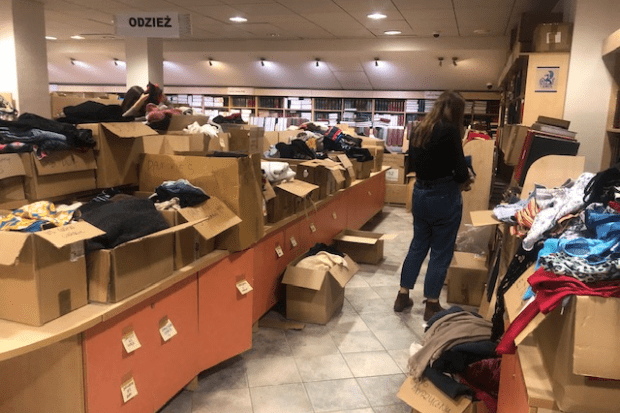“It is not clear how we are going to cope – but somehow we will. The sheer volume of the stuff coming in is overwhelming. But it is heart-warming, too.”
The student volunteer was speaking to me at one of the numerous centres on the University of Gdańsk’s elegant main campus, adorned with Ukrainian flags and signs, that have sprouted up to handle donations for Ukrainian refugees from the university’s staff and students.
Any Ukrainian refugee is welcome to take whatever they need, not just clothes and food but also books and toys. But the donations are coming in so quickly that handling them is extremely time-consuming.
“I am scared that we won’t be able to cope long term,” agrees another volunteer. “And, frankly, I am already anxious about how this will affect my own education and prospects...How is this all going to work further down the line? There are so many people needing help.”
There is a difference between discussing support for Ukraine, declaring it, donating funds and actually physically welcoming those in need. This is what Gdańsk has done.
Its rector, Piotr Stepnowski, pledged active support for Ukraine as soon as Russia launched its attack. Ukrainian students and academics have been welcomed to the university. A grand mansion house outside Gdańsk that was previously used for international conferences and other prestigious events has been turned into a centre for the Ukrainian academics fleeing universities in Lviv, Kyiv and Kharkiv. This required rapid adjustments, at considerable expense, to make it welcoming for whole families. Hundreds of refugees are being housed in another village nearby and another Gdańsk campus has just opened its doors, too.
Marta Koval, a Ukrainian professor who has worked in Gdańsk’s American studies department for 12 years, was asked by university authorities to head the support effort. “We are all shocked and dismayed at the Russian attack,” she tells me when I meet her next to one of the gift centres. “I am so angry I can hardly find the appropriate words.”
Koval researches memory and trauma, but nothing could prepare her for current events. “You have no idea at all how we feel, how I feel,” she says. “As a university, we are doing all we can to offer concrete support, and hundreds of refugees have been housed already…We expect thousands. A number of Polish academics have taken Ukrainian families into their own homes…These are still just temporary measures, but, of course, this may not be a temporary situation. And then what? We still do not know how we can accommodate long term all the students who are flooding in from Ukraine, both in terms of the living space but, more importantly, in terms of their education and future prospects.”
Koval is not the only one to express anger; the feeling is palpable around the campus. Gdańsk has suspended all its educational links with higher educational institutions in Russia and Belarus, but some on campus appear to want to boycott all things Russian. A senior colleague is a Russian language and literature specialist. “It pains me,” she tells me, “that some of our students have been behaving in a hostile manner towards their Russian lecturers, some of whom have been in this country for 20 years and certainly have nothing whatever to do with the current political situation. We cannot ‘cancel’ Russian culture altogether. Can you imagine the world without Tolstoy or Dostoevsky?”
I cannot. But clearly the notion of “decolonisation” from Russian influence is gaining traction and will need to be managed carefully further down the line. Centuries of sometimes successful attempts to colonise Poland have left their mark; during the Soviet era, whole generations – my own included – were forced to study Russian at school.
The same is true of Ukraine. Its own language is somewhere between Russian and Polish, but often Ukrainians’ Russian is better than their Ukrainian. A young Ukrainian I met in the refugee centre said: “I hate the fact that I still cannot speak Polish and that my English is poor, so I have to speak Russian to you. But I swear – come next week, we will converse in Polish.”
Gdańsk is organising psychological support for the refugees and has already set up online Polish language courses. “This has been an overwhelming success,” says Koval. “I use the word ‘overwhelming’ because we had 1,000 people signing in within the first hour.”
Koval’s own sister and elderly mother are in Lviv and have refused to leave for now. She shows me pictures of her sister, who works in a nursery but also, with her husband, makes protective gear for the Ukrainian army. “The Russians will never win this,” she says. “Never.”
We hug and I invite her to give a talk in English for my forthcoming research series. It might seem strange to embark on intellectual projects just now, but it is more important than ever to keep developing research culture at this besieged and brave university.
Stepnowski tells me: “We have always believed in diversity of all kinds. Now it’s a reality, even if it is a burden. We are committed to making it work.”
Perhaps other universities around Europe could do more to share that burden.
Agnieszka Piotrowska is a research professor in film and cultural studies at the University of Gdańsk and a former head of film and media at the University of the Creative Arts.
POSTSCRIPT:
Print headline: This is what practical support for Ukra inian refugees really looks like
Register to continue
Why register?
- Registration is free and only takes a moment
- Once registered, you can read 3 articles a month
- Sign up for our newsletter
Subscribe
Or subscribe for unlimited access to:
- Unlimited access to news, views, insights & reviews
- Digital editions
- Digital access to THE’s university and college rankings analysis
Already registered or a current subscriber? Login








